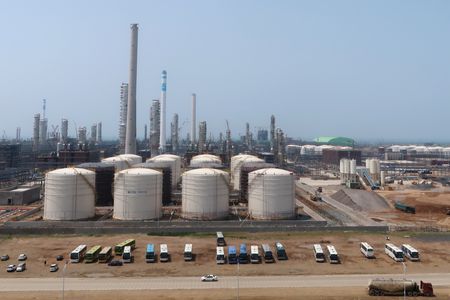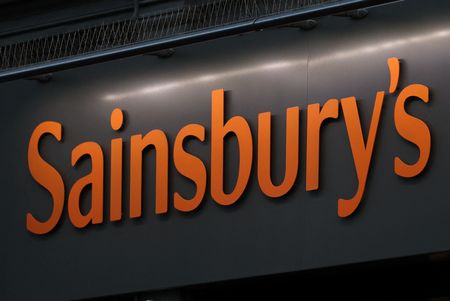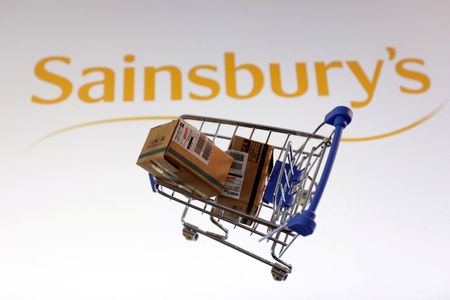By Chen Aizhu and Florence Tan
SINGAPORE (Reuters) – Private Chinese refiner Hengli Petrochemical has snapped up Middle East crude, six traders familiar with the matter said, mostly from TotalEnergies after the French major amassed a large volume of the oil and as Iranian supply to China has tightened.
The purchases follow Hengli receiving an additional crude import quota of 2 million tons (14.6 million barrels) that can be used in 2024 and 2025.
In late November, Hengli Petrochemical bought about 12 million barrels of Middle East crude from Totsa, the trading arm of TotalEnergies, as well as from PetroChina and Aramco Trading Co, according to some of the traders familiar with the transactions.
The barrels, which include grades such as Qatari al-Shaheen, Iraqi Basrah Medium and Upper Zakum from the United Arab Emirates, are to load in December and January, said the traders, who declined to be named due to the sensitivity of the matter.
Iranian crude supply to China has fallen since October, narrowing discounts for the sanctioned oil to their tightest in about five years, pushing some independent refiners to switch back to costlier non-Iranian Middle Eastern oil despite their struggle with weak margins, traders said.
The slowdown comes ahead of expectations that U.S. President-elect Donald Trump will ramp up enforcement of sanctions on Tehran when he returns to office in January and further squeeze Iranian oil exports, which account for more than 10% of crude purchases by China, the world’s biggest oil buyer.
A Dalian-based Hengli executive in charge of crude oil procurement and planning confirmed the refiner stepped up buying of Middle Eastern cargoes thanks to its extra quota and attractive prices, but denied it has previously bought crude from Iran.
“We recently received new quota and the market happens to be in our favour, so we bought some cargoes that have good value for money,” the executive said, declining to be named as he is not authorised to speak with media.
Linking Hengli’s recent purchases to lower Iranian supplies is “pure speculation”, the Hengli executive said.
Reuters reported in July that Hengli emerged as a buyer of Iranian oil earlier this year, with a senior trading source close to the firm saying it had bought 4 million barrels a month during the first few months of the year. Another senior trading source close to Hengli put the volumes at 4 million to 6 million barrels a month.
Data analytics firm Vortexa said at the time that Hengli was a buyer of Iranian crude shipments, based on its tanker tracking information and analysis.
TOTAL SALES
Hengli’s purchases are helping to reduce excess supply held by Totsa after it went on its unusually avid two-month buying spree on the S&P Global Platts price assessment process known as “the window”, the traders said.
TotalEnergies was the top buyer on the Platts window for December- and January-loading Middle East oil cargoes, snapping up a total 23.5 million barrels, trade data reviewed by Reuters showed. Its last prior window purchases were in June, amounting to 4 million barrels of August-loading crude, the data showed.
Traders said they believe Totsa still holds several million barrels after its recent buys.
TotalEnergies did not respond to a request for comment.
IRAN OIL
Last week, Washington designated more vessels and entities for involvement in facilitating Iranian oil trade following a similar move in October.
One of the vessels, very large crude carrier (VLCC) Phonix, has been anchored since last week outside Rizhao Port in China’s independent refining hub of Shandong province, LSEG ship-tracking data shows.
Late in 2019, Chinese independent “teapot” refiners stepped in as key buyers of discounted Iranian crude, filling a vacuum left by Chinese state oil firms wary of U.S. sanctions, saving billions of dollars on the country’s oil import bill and cementing China’s status as Tehran’s top crude market.
Chinese banks have recently refused to facilitate payments for purchases of Iranian oil as the number of sanctioned vessels is rising, said three separate traders who deal in Iranian crude.
“It becomes more and more difficult now as even if you transferred oil from a sanctioned tanker to a non-sanctioned vessel, the latter would soon risk being put on the sanction list,” said one of the three traders.
(Reporting by Chen Aizhu, Florence Tan and Siyi Liu; Additional reporting by Beijing Newsroom; Editing by Tony Munroe and Tom Hogue)










